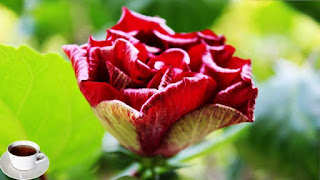Featured
Hibiscus Tea Brewing Methods
Hibiscus Plant
Hibiscus is a plant known for its beneficial properties. The benefits come from the unique chemical composition of plant colours. The flower of the plant;
- Beta-carotene
- Essential magnesium, phosphorus, calcium, etc. including micro and macro elements
- Antioxidant pectin
- B group, vitamins A, C and PP
- Plant flavonoids
- Organic acids
- Amino acids
- Anthocyanins
- Contains polysaccharides.
The use of the beverage as a whole for the whole organism and to support the operation of individual organs and systems cannot be denied. The leaves of the plant have bactericidal, diuretic, anti-inflammatory, spasm, laxative, hemostatic effect. The tea to be obtained from this plant has positive effects on the following.
- Immunity
- Nervous system
- Cardiovascular system
- Digestive system organs
 |
| Hibiscus Tea |
How to Brew?
Hibiscus herbal tea is made with dried herbal leaves at a rate of one tablespoon per 400 ml of subaşı. The use of metal containers for brewing is strongly discouraged, as it may spoil the taste and colour of the beverage. To do this, the flowers should be washed thoroughly with cold water. It should be left overnight for infusion. The useful properties of the plant are excellent, and it also contains indispensable vitamin C. It always preserves its pleasant sweet and sour taste. Hibiscus tea is a storehouse of vitamins, minerals, and other nutrients. It is optionally used at any time of the year to quench thirst and prevent the development of many diseases. This refreshing drink should be allowed to drink as family tea, especially on cold winter evenings. Prevents the occurrence of all disorders occurring in the bird months.
Different Brewing Methods
Tea is brewed in Egypt and other countries. In this way, the benefits of all useful drinks are benefited. For application;
- Take 2 teaspoons hibiscus flower for a glass of water.
- Boil on low heat for about 5 minutes.
- Water already turns into a purple colour by decoction.
- Sweet with a sour taste.
- It is then removed from the furnace, cooled at room temperature and then filtered.
- Adding sugar to the beverage is definitely not recommended.
- The leaves do not lose their original flavour after the preparation of the tea.
- Can be eaten as a vitamin supplement. Only dry leaves should not be eaten. Fresh flowers can be consumed.
- The high content of vitamin C helps protect the body from viruses and other infections.
Cold Form Brewing
For cold brewing of tea;
- 2 teaspoons of hibiscus flower are poured into a glass of water.
- Boil on low heat for about 5 minutes.
- The mixture taken from the furnace is allowed to cool and is filtered.
- Ice is added before consumption.
For the preparation of the beverage, you can only use any non-metal plate. Metal not only distorts the taste of the drink but also kills the beneficial properties. Tea should be in dry form, high quality, leaves should be burgundy in pink colour.
With Drinking Water
- 1 litre of drinking water
- 4 tablespoons hibiscus plant
After thoroughly washing under the cold water, the hibiscus plant is thrown directly into 1 litre of water. In this way, it is kept in the refrigerator for 1 night. During this holding time, the taste, colour, and all effects will pass into the water. 1 litre of this drink is prepared during the day is consumed. It should be consumed regularly, especially by people who have problems with weight loss.
Indications for Use
- Recommended for use in colds or infectious diseases. It allows eliminating pathogenic bacteria in the composition of ascorbic and oxalic acids. It also works to increase the protective functions of the body. This drink works as an antipyretic in the body.
- It offers exceptionally beneficial benefits for people suffering from cardiovascular diseases as well as pressure drops.
- Thanks to anthocyanins, the walls of the vessels are strengthened.
- It also cleans the blood.
- The tea from the Hibiscus plant allows lowering the cholesterol and sugar levels in the blood. This will ensure excellent prevention of diabetes.
- The tea to be made from hibiscus has a unique feature in the separation of toxins, free radicals, and heavy metals from the body. Therefore, it is recommended to use it as a preventive measure against cancer, especially for people living near industrial facilities. This feature is also useful in the fight against alcohol intoxication.
There are anti-inflammatory and antispasmodic components present in the composition. The use of tea infusions from hibiscus makes it possible to use as an expectorant and bactericidal agent for bronchitis, trachea, cystitis. To take advantage of these properties, the prepared tea must be used regularly, made from natural plants and brewed freshly.
